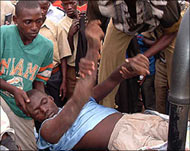Ugandan presidential race tight
Yoweri Museveni, the Ugandan president, has taken a strong early lead over his doctor-turned-rival Kizza Besigye, according to official results.

The lead prediction is based on 7.7% of the east African country’s polling stations.
The results showed Museveni, in power for two decades, with 59.6% of the vote. Besigye, leader of the Forum for Democratic Change (FDC), received 37.3%, the Electoral Commission (EC) said.
Final results are expected on Saturday afternoon.
Voters were also choosing 284 members of parliament.
Ugandans showed up in large numbers on Thursday to vote in the country’s first multi-party elections in more than 25 years, a vote widely seen as a referendum on Museveni’s 20-year rule.
Sudden downpours soaked open-air polling stations across the country, but did little to dampen turnout in this East African nation, where critics say Museveni’s government has become increasingly authoritarian.
Four candidates stood against him.
Besigye challenge
Besigye, former comrade-in-arms and physician, posed the greatest threat – even after having to split his time between campaigning and standing trial for treason, rape and other charges he and his supporters maintain were trumped up to hurt him in the election.
 |
|
In the run up to the poll, Besigye |
Sara Eperu, a spokeswoman for Besigye, said on Thursday that some of Besigye’s representatives had been arrested and that many of his supporters did not vote because their names had been deleted from the voters’ register.
She said: “It has been rigged in many areas where the population is sparse. In some polling stations our supporters have been chased away.”
Electoral officials reported orderly voting and high turn out. They said the main problems consisted of voters not finding their names on the register. Assuman Mugenyi, a police spokesman, said there was no significant violence.
Voters turned out in large numbers in northern Uganda, an opposition stronghold where more than two million people live in camps because of regular raids by a rebel group that has been waging a 19-year civil war.
The switch to multi-party elections, approved by voters in July, had been seen as a step toward greater democracy. Museveni had argued in the past that the no-party system was the antidote to tribal divisions that led to years of civil strife.
When asked after casting his vote on Thursday if he would win, Museveni said: “It is not up to me, it is up to the people.”
Intervention
Museveni has frustrated international donors and reformists at home by intervening in neighbouring Congo‘s civil war, increasing military spending and refusing to retire from politics as he had promised to do in 2001.
Human rights groups have said the elections were unlikely to be free and fair because of violence and intimidation by security forces loyal to Museveni and his National Resistance Movement.